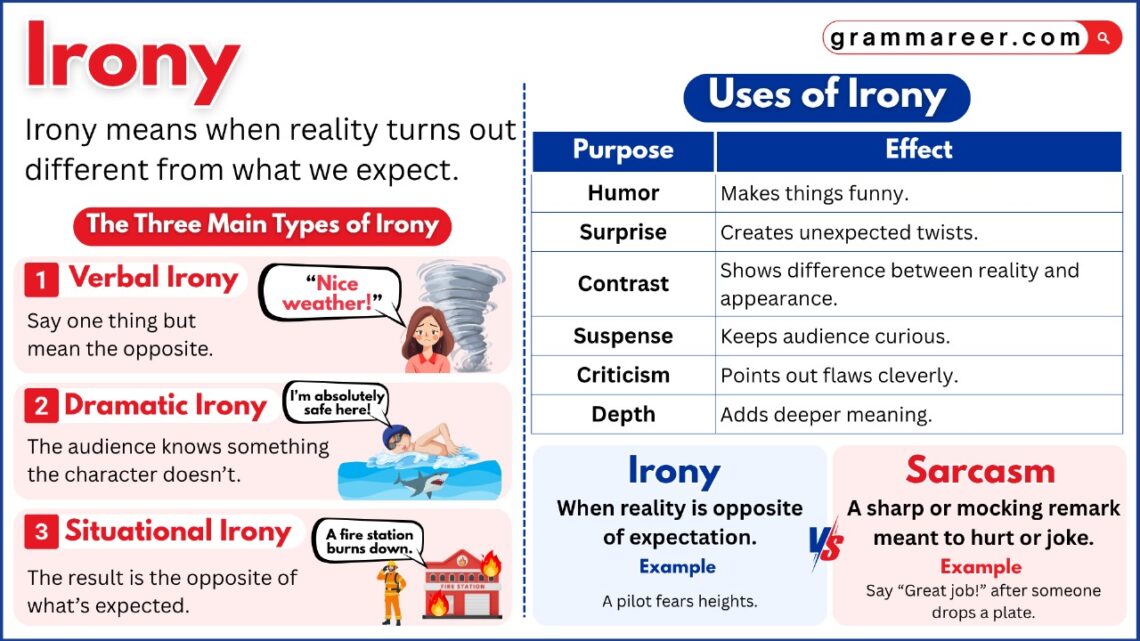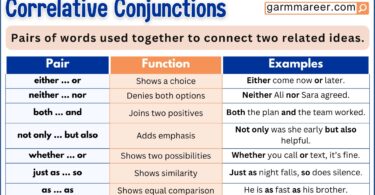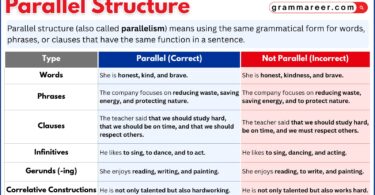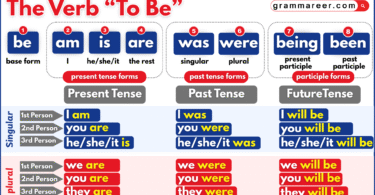Have you ever waited all day for something exciting, only to get the complete opposite? Like waiting for sunshine on your picnic day and ending up with rain instead. That’s life’s little way of using irony. It’s when things don’t go as we expect, and the result feels surprisingly opposite. It adds humor, surprise, or even depth to our words and stories.
In this article, we’ll learn what irony really means, explore its different types, and see some easy examples to understand it better.
Table of Contents
What is Irony?
Irony happens when things turn out differently from what we expect. It’s that twist that makes a situation funny, surprising, or even a bit confusing. In simple words, irony is when reality doesn’t match our expectations.
For example, imagine a fire station catching fire or a traffic police officer getting a parking ticket. That’s irony in action! Writers often use it to make their stories more interesting, add humor, or make readers stop and think.
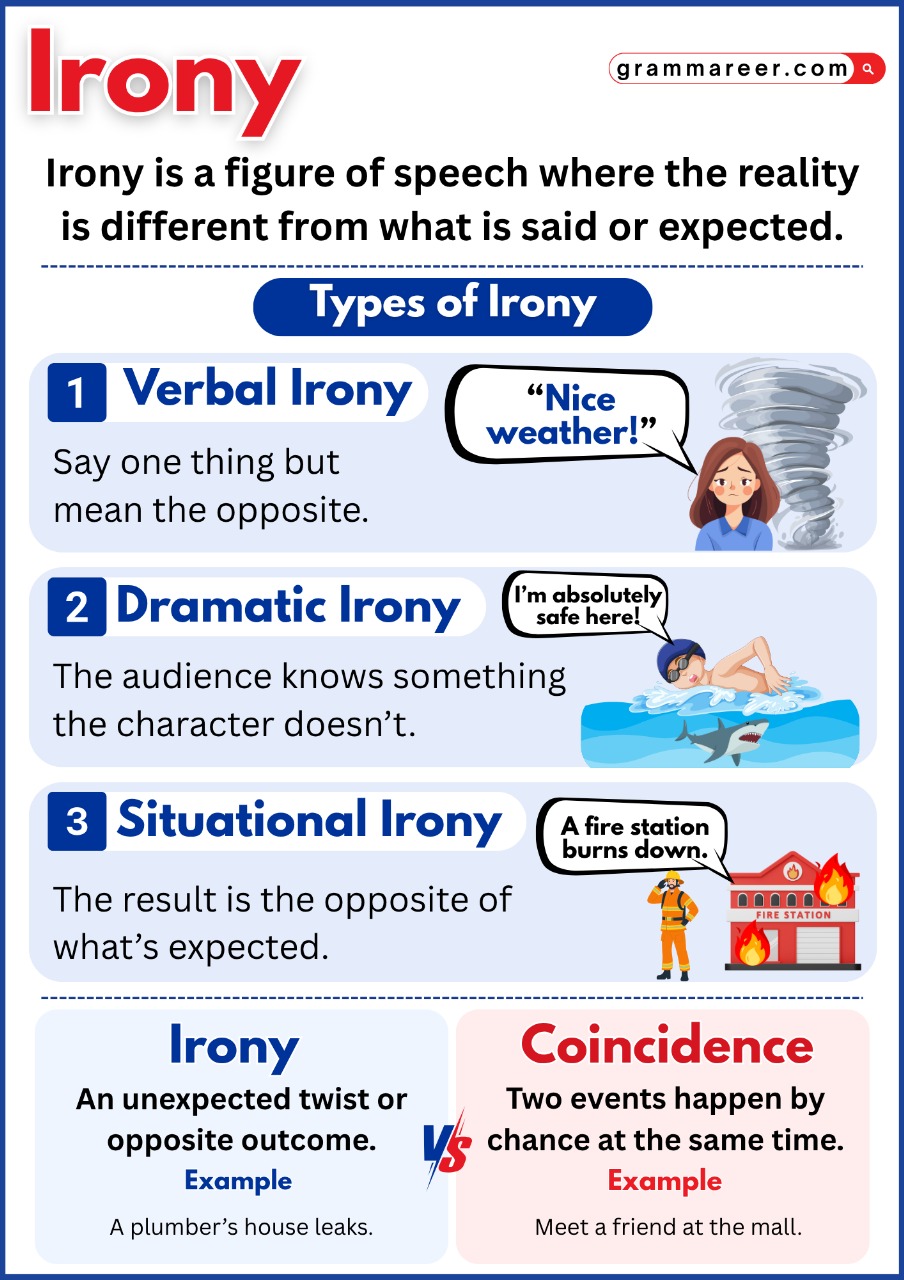
The Three Types of Irony
Now that we know what irony means, let’s explore its main types. Each type adds a unique twist to how we understand situations, words, and stories.
1. Verbal Irony
Verbal irony is when someone says something but means the opposite. It’s not lying — it’s more like being playful or sarcastic with words. People often use verbal irony to be funny or to make a point without saying it directly.
Example:
- Imagine it’s raining heavily, and your friend says, “What a beautiful day for a picnic!” Clearly, they don’t mean it — that’s verbal irony.
Writers also use this kind of irony to show a character’s attitude or create humor in dialogue.
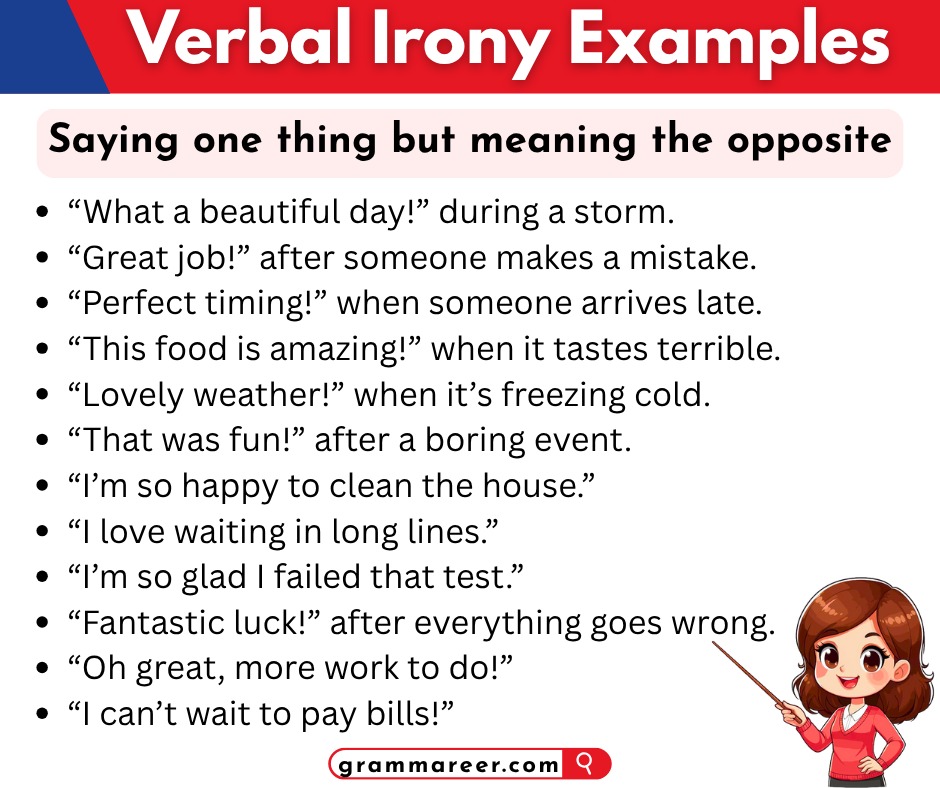
2. Situational Irony
Situational irony happens when something turns out very differently from what we expect. It’s that twist in a story or moment in life that makes you go, “Wait, that’s not supposed to happen!”
Example:
- A plumber’s house has leaking pipes. Or a traffic police officer gets a speeding ticket. The situation flips your expectation — and that’s what makes it ironic.
In stories, situational irony keeps readers surprised and makes the plot more engaging.
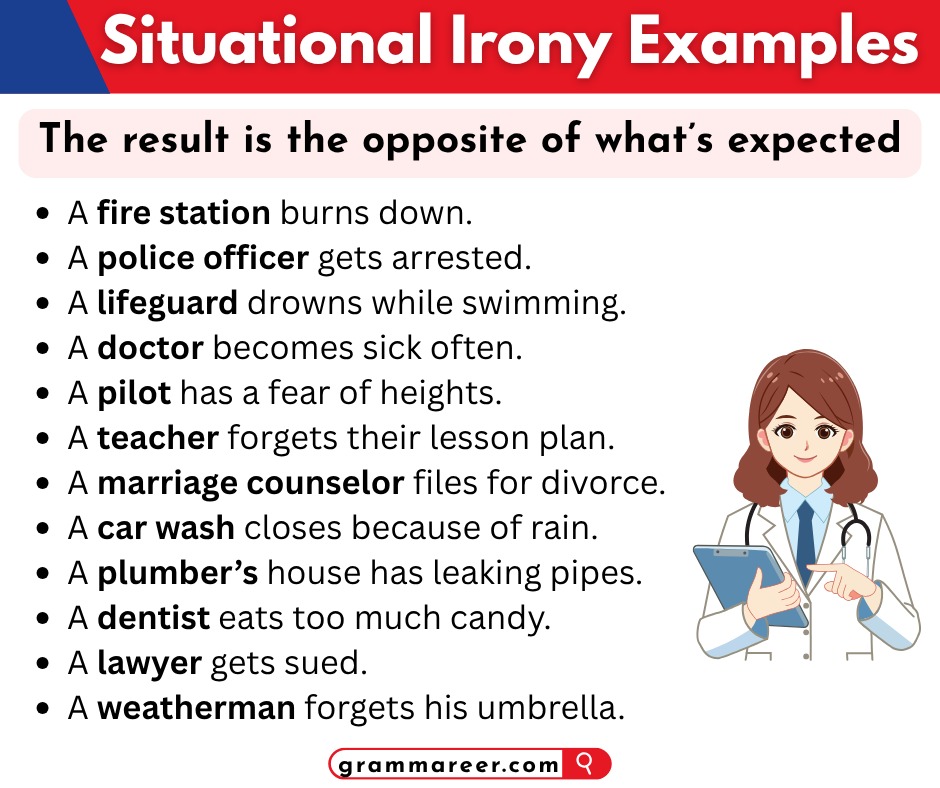
3. Dramatic Irony
Dramatic irony is when the audience knows something the characters don’t. It creates tension, excitement, or even humor because we can see what’s coming — but the characters can’t.
Example:
- In a movie, the audience might know that the villain is hiding in the next room, but the hero walks in calmly. We’re sitting there thinking, “Don’t go in there!” — that’s dramatic irony in action.
Writers use this to build suspense and make readers or viewers feel more connected to the story.
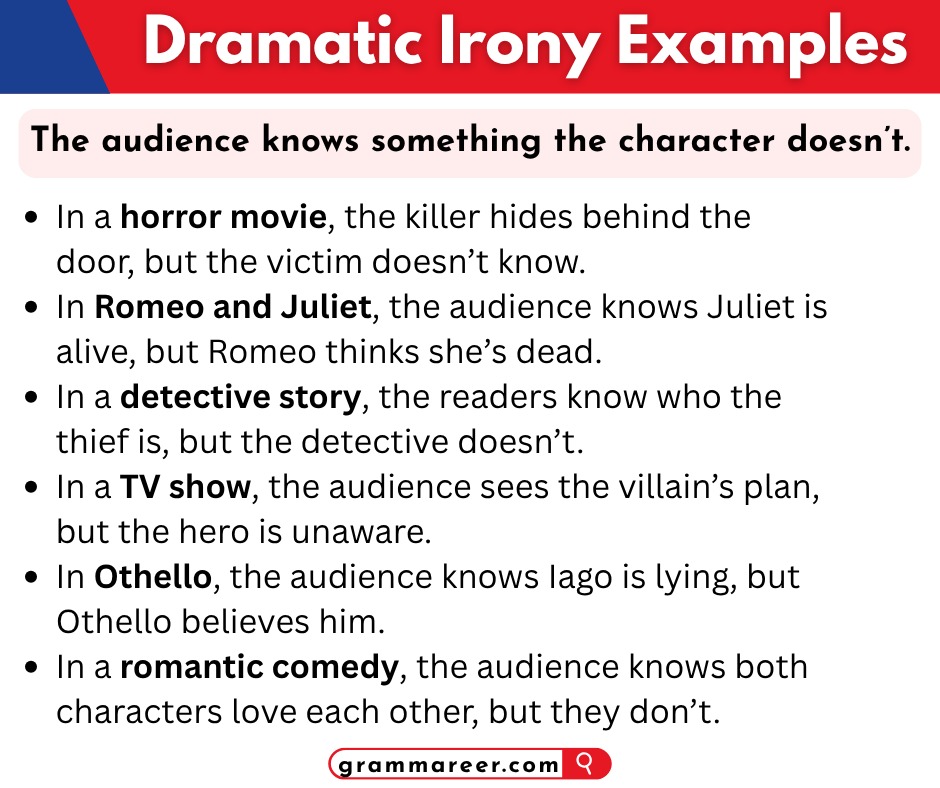
Why Do Writers Use Irony?
Writers use irony to make their stories more interesting, meaningful, and fun to read. It’s a clever way to grab the reader’s attention and make them think beyond the surface.
One reason writers use It is to highlight a point or message in a stronger way. When something unexpected happens, it naturally stands out.
It also makes readers stop and think about what’s really going on — not just what appears to be happening. It invites the audience to look deeper into a character’s thoughts or a situation’s true meaning.
Another reason is to add humor or surprise to a story. Sometimes, It lightens the mood; other times, it adds a sharp twist that keeps readers engaged.
What’s the difference between irony and sarcasm?
People often mix up irony and sarcasm because both involve saying something that’s opposite of what’s true. But they aren’t exactly the same thing.
Sarcasm is usually spoken and has a sharp or teasing tone. It’s often used to make fun of someone, express annoyance, or highlight a mistake — sometimes in a funny way, sometimes not.
For example, if your friend trips and you say, “Wow, graceful as always!” — that’s sarcasm.
Irony, on the other hand, is bigger than just spoken words. It can happen in situations, actions, or stories. Irony doesn’t always aim to hurt or mock; sometimes it just shows the difference between what we expect and what actually happens.
In short, sarcasm is like a playful (or biting) comment, while irony can show up anywhere — in speech, events, or even in life’s little surprises.
Examples of Irony
It can be found everywhere — in stories, movies, and even in everyday life. Let’s look at some simple examples of the three main types of irony so you can easily spot the difference.
Examples of Dramatic Irony
- In Romeo and Juliet, the audience knows Juliet is alive, but Romeo believes she’s dead.
- In a movie, the killer hides in the closet while the character says, “There’s no one here.”
- A character in a story says, “I trust him completely,” while the reader already knows he’s the villain.
- In Titanic, passengers call the ship “unsinkable” — and the audience knows what’s coming next.
Examples of Situational Irony
- A fire station catches on fire — the one place we’d expect to be safest from flames!
- A pilot who’s afraid of heights — now that’s unexpected and ironic.
- In O. Henry’s short story The Gift of the Magi, a husband sells his watch to buy his wife a hair comb, while she sells her hair to buy him a chain for his watch. Sweet but ironic, right?
Examples of Verbal Irony
- “Oh, great! Another traffic jam!”
- “What a beautiful day,” said during a thunderstorm.
- “That test was a piece of cake,” after completely failing it.
- “Nice job!” when someone spills coffee everywhere.
- In Julius Caesar, Antony says, “Brutus is an honorable man,” but means the opposite.
Examples of Irony in Speaking
- “What a beautiful day!” during a storm.
- “I just love traffic jams!” while stuck for hours.
- “Great job!” when someone makes a mistake.
- “Perfect timing!” after arriving late.
- “I can’t wait to do my homework!”
- “Oh, fantastic! Another meeting!”
- “I’m so happy to clean the whole house.”
- “Lovely weather!” when it’s freezing cold.
- “That was fun!” after a boring event.
- “Just what I needed!” after something bad happens.
- “I’m thrilled my phone broke again!”
- “Wow, you’re so early!” when someone is late.
- “This food is amazing!” when it tastes terrible.
- “I totally wanted to step in that puddle.”
- “Oh great, more work to do!”
Examples of Irony in Literature
- In The Lottery, a joyful town event ends with a death.
- In Hamlet, he delays revenge only to die with everyone else.
- In Lord of the Flies, the boys are rescued by a man involved in war.
- In Cinderella, she’s treated as worthless but becomes royalty.
- In The Great Gatsby, Gatsby dies pursuing a false dream.
- In Huckleberry Finn, Huck lies to protect Jim, showing moral truth.
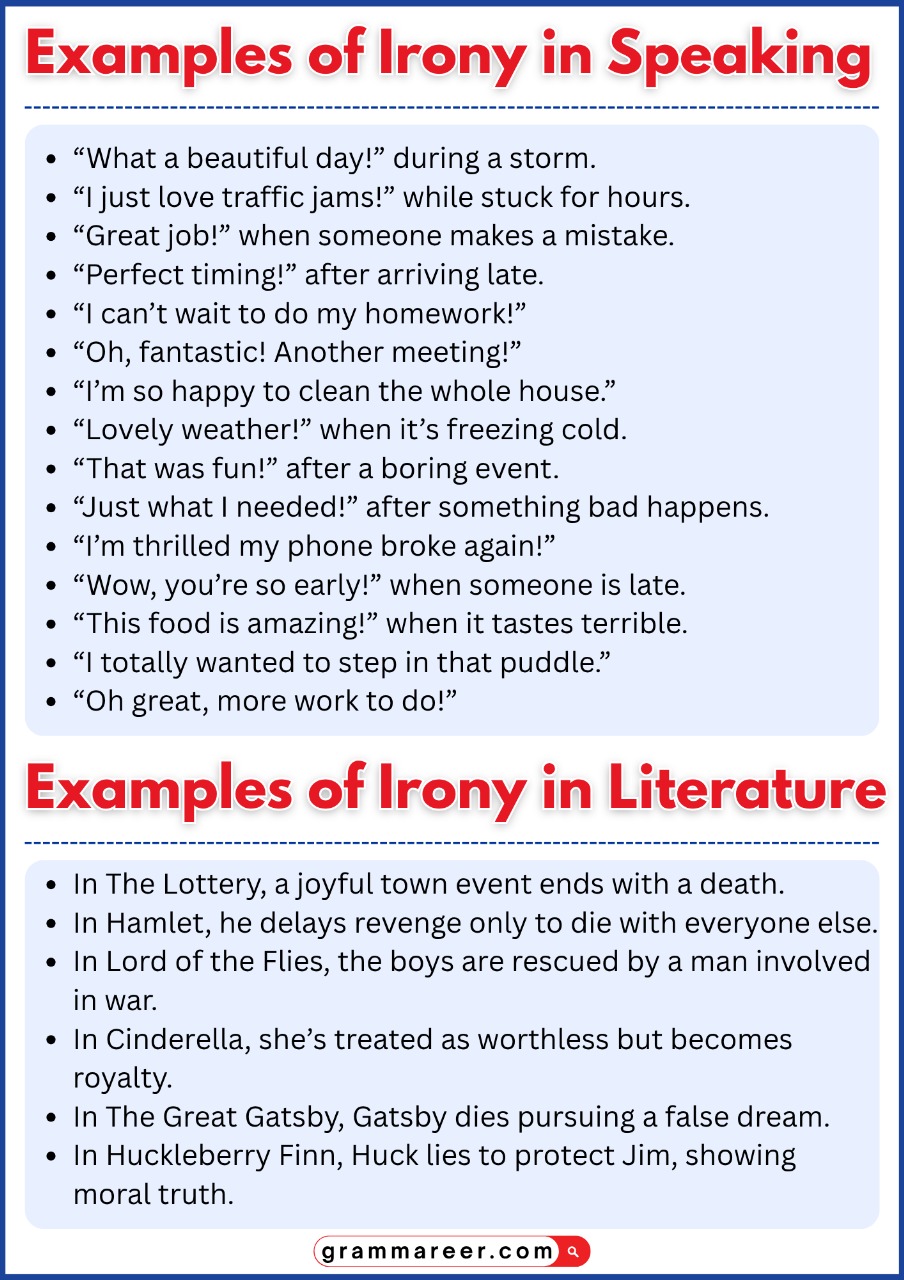
FAQs about Irony
Irony is when things turn out differently from what we expect. It’s a twist between appearance and reality — when what’s said or done means the opposite of what’s expected. Writers and speakers often use irony to add humor, surprise, or deeper meaning.
There are three main types of irony:
Verbal – when someone says one thing but means another.
Situational – when events turn out opposite to what we expect.
Dramatic – when the audience knows something that the characters don’t.
Irony is a literary device used to show contrast between expectation and reality, while satire is a style of writing that uses humor, irony, or exaggeration to criticize or expose human flaws, society, or politics.
In simple words, it is a tool, and satire is the work that often uses that tool.
You May Also Like

